- Home
- J. M. Hayes
Plains Crazy Page 9
Plains Crazy Read online
Page 9
“I thought I was doing what John Wayne would do. Or Bogart. You and I were only kids and I…Well, I suppose you’re right. Your mother never forgave me for that one.”
“She was your confirmed enemy long before that. She knew you wanted in her little girl’s pants, and were making significant progress toward getting there. Actually, I’ve never been quite sure whether that kidnapping was a terrible male-chauvinist act of dominance, or the most romantic thing that ever happened to me. But they’d call you a stalker these days, or worse, and my mother would get a restraining order and maybe put you in jail.”
Mad Dog laughed as he reached down and rumpled Hailey’s ears. She was sticking unusually close to him, a little jealous maybe. “It seemed like the thing to do at the time,” he said. “But it sure caused a commotion in Buffalo Springs that summer.”
He bent and plucked a couple of ones from a clump of Bermuda that was making good use of a crack in the pavement. The bills came up bloody, like the twenties. His hand had stopped bleeding. He started checking his arm for a wound.
“Oh dear,” Janie said, interrupting their reminiscences and his self examination, focusing his train of thought, quite thoroughly, elsewhere. “You’re not bleeding. It’s your dog.”
***
Chaos. Deputy Parker didn’t like chaos. It reminded her of that bleak day in Tucson.
She parked the Benteen County black and white in front of the bank and stepped out into a street filled with citizens who wanted to tell her what had happened, and didn’t really know.
Someone handed her a shoe box and told her, “I think we’ve found most of it.” It was one of the Heathers, the sheriff’s daughters. Parker never could tell which was which. Not that it mattered, since she only had to remember one name. “But you’ll want to count it.”
What she didn’t like about the Heathers was the way they seemed to think their father’s employees were incapable of making competent decisions without direction. Of course, considering the rest of Englishman’s deputies, they were right.
“Thanks, Heather,” she said. “Have you counted it?”
“Sure. $4,878. Mr. Brown, the manager, said they only had ten thousand out of the vault and the robber said she wanted exactly five, all in hundreds. They had seven thousand in hundreds, the rest in smaller bills. We’ve found all but one of the hundreds. Mr. Brown thinks we’re only missing that and a twenty and two ones. We’ve got people looking.”
Parker popped the lid and glanced inside. The box was filled with cash. Some of it looked singed, some crisp and new. At least one bill was blood soaked.
“Mad Dog found that one,” the Heather said. “Hailey was hurt. You know, his wolf. He gave Heather the money, then took off to get Hailey’s wound looked at.”
Parker nodded. She wasn’t done with Mad Dog, but she didn’t have time to go looking for him now. She jotted the dollar amount Heather had given her on top of the box, along with the date and time, and the name, Heather English.
“Lane, actually,” Heather corrected her. That would make this Heather number Two, the sheriff’s adopted daughter. Parker made the correction, popped the trunk, and locked the box of money in the black and white. She took out her roll of crime-scene tape and began boxing off the front of the bank. The walls seemed faintly bowed out and the front door hung ajar. Its safety glass, checkered with cracks, lay on the steps and sidewalk.
“Were you a witness?”
“No,” Heather Two said. “We were headed for the Buffalo Burger Drive In for breakfast when we heard the explosion. We came back to look, then got involved in picking up cash.”
“I need to talk to witnesses.”
Two understood. She nodded to where several people huddled, comforting each other, on the curb just down the block. “There’s Mr. Brown and his tellers. I can finish stringing this tape if you want to talk to them.”
That wasn’t the way it was supposed to work, but Parker, with no other deputies available, could use the help. And the Heathers probably knew more about police procedures than anyone else she was likely to find.
“Good,” Parker told her. “Just surround the building, or, if you can’t, block the entrances and exits. Then, you and your sister can start sorting through this crowd for me. Find out who actually saw something and who’s just here rubbernecking. Send the sightseers home.”
“Sure,” Heather agreed. The idea of helping seemed to appeal to her. And following reasonable instructions instead of delivering them didn’t appear to be a problem either. Maybe, Parker reassured herself as she went to where the bank’s employees clustered, the sheriff’s daughters had helped handle crises like this before. Only this was Buffalo Springs, she remembered, where nothing ever happened. It was why she had taken a job here.
Mr. Brown was drawn to her uniform. He left the group and came to meet her. “I’m the manager,” he told her, establishing his importance. “Have you caught her yet?”
“Were you a witness to the robbery, sir?” she countered. She’d discovered that men like Brown were used to bullying the sheriff’s deputies, and they weren’t used to deferring to women as authority figures, except maybe their mothers. Bullying right back was usually the best way to establish who was in charge.
“Uhh, well, no, but I know what happened and the bank is my responsibility.”
“Good. Then you’ll want to help me deal with this as efficiently as possible. Mrs. Kraus said you read her a note. Do you have it?”
He reached into the pocket of his sports coat. “That I do,” he said, unfolding it.
She reached in a pocket of her own and removed a plastic bag. “Put it directly in here, please. Don’t let it touch me.” He recoiled a little, but he did what she asked. The good thing about combining a uniform with no-nonsense commands was that people generally did what you told them.
“Has anyone else touched this? Has it been anywhere other than in your pocket?”
“Lucy touched it. My teller. She was the one who picked it up in the first place, and let that woman in to rob us. But nobody else. She gave it to me and I’ve kept ahold of it since.”
“Good,” she said. “We’ll probably need to get your fingerprints, and hers, and DNA samples. And I’ll take that coat of yours now, too, if you don’t mind.”
Paper was notoriously bad about yielding fingerprints. As for the rest of it, they had no DNA test equipment and no one to analyze fibers from the letter or the jacket, but he seemed steadily less inclined to argue, and more convinced that the Benteen County Sheriff’s Department knew what it was doing. She glanced at the note through the plastic. It was just one of those freezer bags with the strip that changes color when it’s properly sealed, but he didn’t know that.
The note said what Mrs. Kraus had told her it would, and nothing more. She transferred it, and Brown’s coat, to the trunk of the black and white beside the money. “That’s all I need from you for now, Mr. Brown. Would you please send Lucy over to talk to me? Just Lucy. Thank you for your cooperation.” And sign the traffic ticket and have a nice day.
Brown retreated and his teller replaced him. Parker opened the front door of the black and white for her. Lucy looked doubtful, like she thought maybe Parker was going to haul her to jail and charge her with aiding and abetting the crime.
“I thought you might like to sit somewhere other than on the curb for a few minutes,” the deputy explained. “And we can have a little privacy.”
Lucy nodded and sat and Parker closed the door and went around and slipped behind the wheel. She pulled out her notebook and pen.
“I’ve been thinking,” Lucy said. “That face. I mean, right from the beginning I thought it seemed familiar. For a minute, I thought it might have been one of my daughter’s teachers from back when she was in school here, but that’s crazy. And so’s this, I suppose, but I believe I know who it was.”
“Really?” That would be a break. They could use one after two bombs, one murder, and another attempt.
&
nbsp; “Yes,” she said. “I didn’t tell anyone because I was afraid they’d laugh at me.”
“I understand,” Parker said, not understanding at all but trying to cut to the important part. “Who was it?”
“Well, anybody can disguise their voice, right? And cut their hair real short. And bleach it blond.”
“Yes?”
“I mean, it was the eyes, really. They were so intense.”
“You recognized the eyes?”
“Right. I mean, it makes sense. An al Qaeda terrorist would want to be disguised. Speak in falsetto, cut your hair short and bleach it blond, get rid of the turban and the beard, and it could be him.”
“Beard? Turban?”
“Don’t you see? Our bank robber, I think he was Osama bin Laden.”
***
Judy would not have been flattered to know the teller had confused her with Osama bin Laden. Though maybe there was something about the eyes…She might have thought so if she’d bothered to study them just then. She was too busy examining her platinum crew cut.
Judy had ridden a couple of blocks from the bank before she realized she couldn’t let Englishman get bogged down searching for a blond bank robber. She checked her fanny pack for her cell phone, then remembered it was plugged in at home, getting charged so it would be ready when she left for Paris.
Home was where she wanted to go, but then she wanted the Heathers up and involved in their own plans before she broke the news about Paris. Considering Englishman#8217;s response, she thought later rather than sooner would be the best time to tell them about her sudden vacation plans. It was after ten, now. The girls had probably left the house, but they were teenagers and might lounge about on a morning without school. She didn’t want them overhearing her conversation with their father, especially if it didn’t go well. And Judy could see how it might not go well, since she still expected him to be with her on that Paris flight, in spite of a murder and the bomb in the Farmers & Merchants. Paris was a must. She didn’t care how many things he needed to deal with.
That was why she detoured to the courthouse. She’d hoped Englishman might be back from the murder site. Maybe she could explain, and make him understand, face to face in his office, especially if Mrs. Kraus could be persuaded to take a coffee break and give them some privacy.
But, once through the front door, she’d realized how dramatically different she looked, and that Englishman’s deputies might be watching for someone who fitted her description. Wynn Some had been known to shoot first and ask questions later, so she’d ducked into the restroom instead of the sheriff’s office. She peered into the mirror at what she increasingly thought of as an ultimate bad-hair choice. She couldn’t let anyone see her like this. Not before she explained to Englishman.
She rummaged through her fanny pack again. She kept a bandana in there, one of Englishman’s. He never used it. She’d appropriated it as something colorful to tie up her hair. There was nothing to tie up anymore, but she found she could wrap the cloth around her head and bunch it to cover the blond. With the cap back in place, it looked like she was hiding her hair instead of no longer in possession of it.
The ruse seemed to work on Mrs. Kraus. “Hi, Judy,” the little woman with the Marianne Faithful rasp said. “Englishman’s not here. I just got off the line with him. He might be awhile. Seems he just killed a prime suspect in that bow-and-arrow murder this morning.”
“Oh good,” Judy responded, causing Mrs. Kraus to raise a shocked eyebrow. “Not that somebody’s dead,” Judy clarified. “Just that one crime may be solved. He’s leaving on vacation today. Did he tell you?”
The second eyebrow followed. “Vacation?” Pole axed would be a good way to describe her reaction. “While a terrorist runs around bombing Buffalo Springs?”
“That’s what I wanted to talk to him about. Could I maybe borrow one of your phones? I could cover the office while you run get yourself something over at Bertha’s if you want.”
“This might not be a good time,” Mrs. Kraus said. “Englishman’s got his hands full with that new body just now, and I’ve got to stay here to direct the citywide search that’s going on.”
“Oh.” So much for that plan. Judy smiled and started backing toward the door. “Well, when you talk to him again, just tell him I was kind of a witness at the bank and he should call me as soon as he can.”
“Might not be soon,” Mrs. Kraus said. One of her phones rang and she turned to answer it.
Coming here had been a really bad idea and Judy punished herself with a quick smack to the forehead, inadvertently knocking her cap and bandanna to the floor of the foyer. She bent and picked them up and sprinted for the front door, restoring her disguise as she went to retrieve her bicycle.
She was quick, but not quick enough to prevent Mrs. Kraus from turning to see that Judy had disappeared, but the blond terrorist who’d hit the bank was darting past her door. Judy would have been impressed at how fast two bombs, and Mrs. Kraus’ panic, resulted in the evacuation of the courthouse.
***
The sheriff began by checking for a pulse. Since the motorcyclist’s skull was about half the size it had been before encountering the tree trunk, he wasn’t surprised when he didn’t find one. No point in trying CPR. Not on a rib cage that had been smashed to a pulp filled with jagged bone fragments.
After a quick call to Mrs. Kraus to let her know why he would be delayed, he pulled out his digital camera and recorded the scene, the skid marks, the motorcycle, and the position of the body before he moved it more than his preliminary examination had required. He considered asking Doc to come pick up another one, then decided there wasn’t time. Not with a bomber running around Buffalo Springs, assaulting the courthouse and now robbing the city’s only financial institution. He had to get to town and quick.
He removed a pair of surgical gloves and some plastic bags from the truck. Traffic accidents were the most common form of violent death in Benteen County. He had handled too many.
“Mr. Stone. I hate to ask, but I need a witness. Would you step out of the truck and watch while I examine the body.”
The old man opened the door and walked across the road. The sheriff gently peeled the crumpled form off the cottonwood’s trunk. Some of its teeth and a piece of cheekbone remained behind, imbedded in the bark until the sheriff removed and bagged them.
There would be no recognizing this face. Its features now conformed to the shape of the tree trunk, no longer remotely human. You should have worn a helmet, he thought, instead of that stocking cap, now stained with blood and brain matter like the curly blond locks that protruded from underneath.
The sheriff straightened the body on the grass at the edge of the road. It wasn’t hard to do. It bent easily, too easily, and in places humans did not normally bend.
“I’m going to go through his pockets,” the sheriff told Bud Stone. “That’s what I want you to witness. Especially if I find anything of value, or something that might be incriminating.”
He opened one of the plastic bags and set it beside the corpse. The remains of the bow were already in a larger bag. No arrows though. Either the man had fired the last of them or he’d lost them before encountering the sheriff…and a cottonwood, and eternity.
The sheriff got down on hands and knees on the opposite side of the body from where Stone stood and began going through pockets. He was glad for the gloves. There was a lot of blood and occasional bits of tissue that didn’t belong on this side of skin. There was also nothing in any of the pockets. No change, no billfold, no driver’s license. And the corpse wore no watch or any other jewelry. The sheriff was surprised. He had assumed this was someone local. If so, why bother removing things by which you could be identified, since one look at your face was normally all it would take? Too bad there was no longer a face.
“Nothing,” he said. Stone nodded. And there hadn’t been anything on the motorcycle either, including license plates. Could this guy be an outside professional? Or som
ehow related to their terrorist?
The only way to identify him might be through Doc Jones. Doc could take fingerprints—the sheriff had examined the man’s hands and been relieved to see that there were normal looking ridges and swirls there. After everything else, he’d half expected to find them etched off or surgically removed. Or Doc might get what he needed for identification purposes from the teeth.
The sheriff took his evidence bags back to the truck and stored them. He emerged with a larger bag—a fancier version of what he’d seen too many buddies put into during his brief stint in Vietnam.
The man wasn’t big and the sheriff managed to roll him into the body bag without much difficulty. Lifting him into the truck bed might be another matter. The sheriff didn’t want to add post-mortem injuries by manhandling the corpse.
“Can you give me a hand with him?” the sheriff asked Stone.
“Sure,” the old man said. The sheriff thought he detected some reluctance.
“Look, if you’d rather not…”
“No. It’s all right,” Stone said. “Do you have some sage?”
“Sage?” The sheriff didn’t get it.
“Never mind. Shall I take his feet?”
The sheriff told him that would be great. They maneuvered their awkward package into the back of the pickup and placed it there, as gently as possible. Then the sheriff went back to move the motorcycle out of the road. It would have to wait.
When he turned back, Bud Stone was moving his arms from over his head, crossing them, and touching the ground. The man had crouched with his eyes closed, speaking words in a language the sheriff didn’t understand.
“Are you all right, Mr. Stone?” he asked, when the Cheyenne finished.
“I am now,” Stone said. “I purified myself, but sage would have helped.”
“Uhh, right,” the sheriff said, climbing behind the wheel.
Stone joined him in the cab. “You should do the same, you know.”
The sheriff wondered if that might not be true.
***
“Damn it, Mad Dog. I’m a medical doctor, not a veterinarian,” Doc Jones said, rising from behind his desk in the coroner’s office. “Excuse my language, ma’am.” He directed that at Janie Jorgenson, who crowded into the little room behind Mad Dog and Hailey.

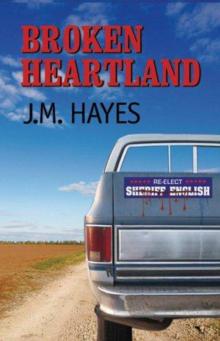 Broken Heartland
Broken Heartland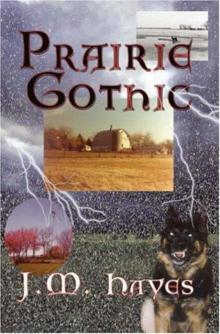 Prairie Gothic
Prairie Gothic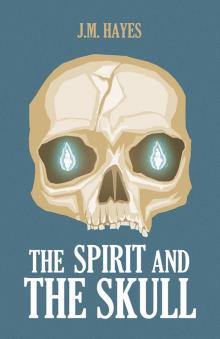 Spirit and the Skull
Spirit and the Skull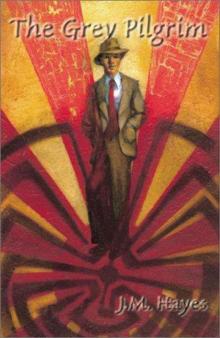 The Grey Pilgrim
The Grey Pilgrim Plains Crazy
Plains Crazy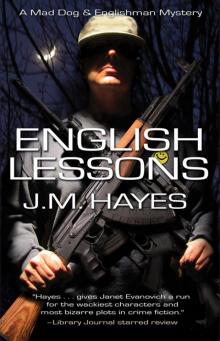 English Lessons
English Lessons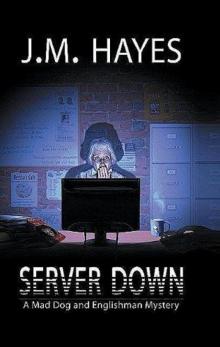 Server Down
Server Down